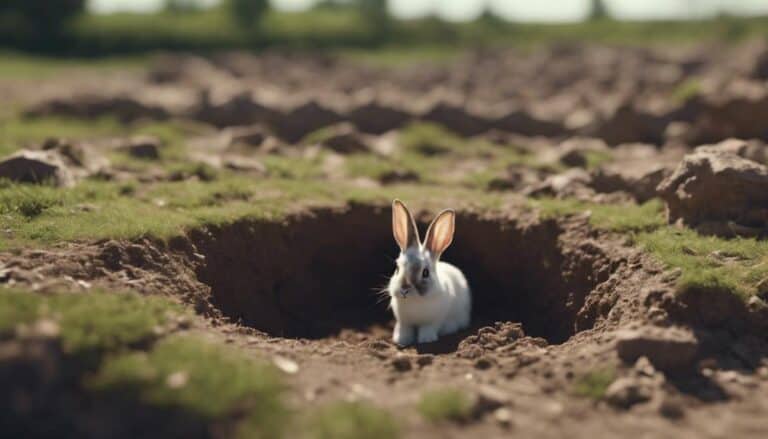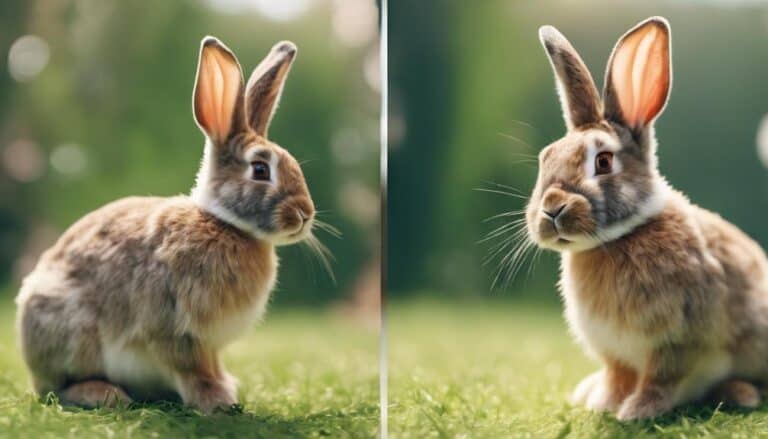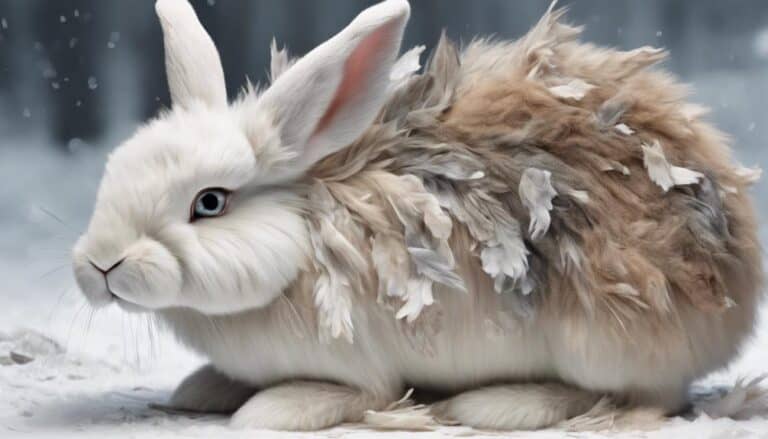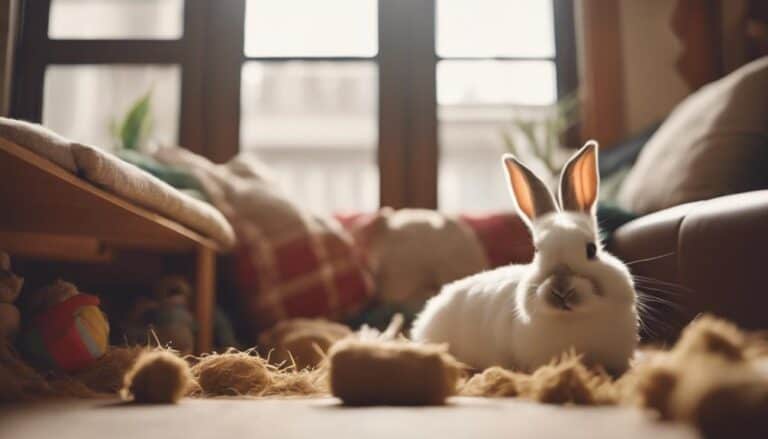If you've ever wondered about the dietary habits of bunnies, the question of whether they can eat pickles might intrigue you.
While pickles are a popular snack for humans, their impact on rabbits is quite different.
The potential effects of pickles on bunnies' health can be surprising.
Before deciding whether to offer your furry friend a taste of this tangy treat, it is important to understand the risks and benefits associated with pickles in a rabbit's diet.
Contents
Key Takeaways
- Pickles with high sodium harm bunny health, causing dehydration.
- Vinegar in pickles disrupts bunny gut flora, posing risks.
- Pickles lack nutrition for bunnies, leading to digestive issues.
- Avoid pickles to safeguard bunnies' well-being and health.
Potential Benefits of Feeding Pickles to Bunnies
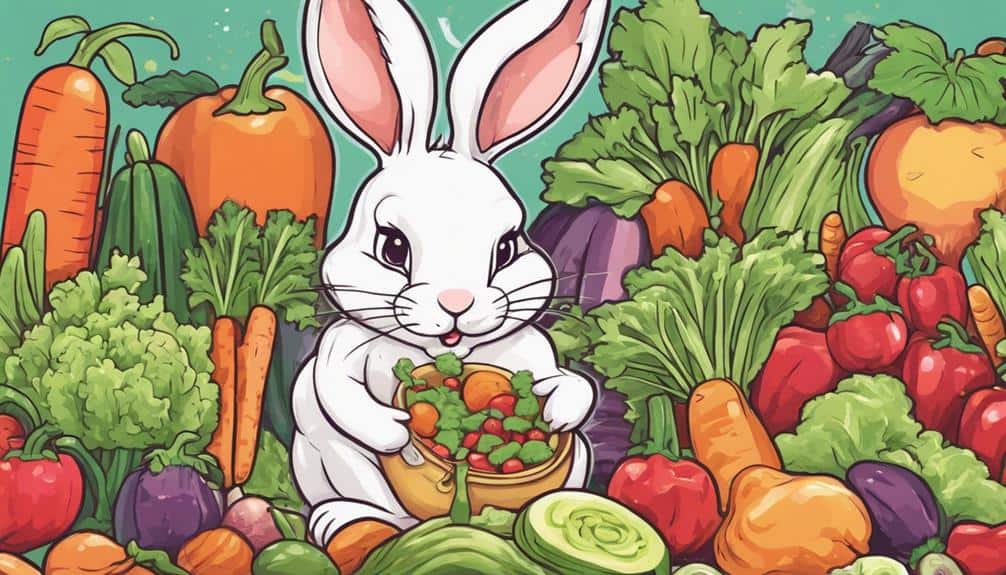
Feeding pickles to bunnies doesn't provide any significant benefits and can actually be harmful to their health. While rabbits have a diverse diet that includes various vegetables, pickles shouldn't be on the menu.
Pickles contain high amounts of salt, vinegar, and sodium, which can be toxic to bunnies. The dill used in pickling can also be problematic for a bunny's digestive system. These ingredients can lead to digestive issues, dehydration, and other health problems in rabbits.
Since pickles offer no nutritional value for bunnies and can potentially harm them, it's best to avoid feeding pickles to your furry friends. Instead, focus on providing a balanced diet rich in fresh vegetables and hay to ensure your bunny's optimal health and well-being.
Risks Associated With Pickles for Bunnies
When considering the dietary health of your bunny, it's important to understand the potential risks associated with pickles. Pickles contain a high amount of sodium chloride, making them dangerous for rabbits even in small amounts. Here are some key risks associated with pickles for bunnies:
- High Sodium Levels: Pickles contain a lot of sodium, which can be toxic to rabbits and lead to kidney damage.
- Digestive Disruption: The vinegar in pickles can disrupt a rabbit's gut flora, causing digestive issues and discomfort.
- Harmful Ingredients: Ingredients like garlic found in pickles may be harmful to bunnies and should be avoided in their diet.
It's essential to prioritize your rabbit's well-being by steering clear of foods like pickles that can pose serious health risks. Keeping a close eye on their diet and ensuring they consume rabbit-safe foods will help maintain their health and happiness.
Essential Considerations for Bunny Pickle Consumption
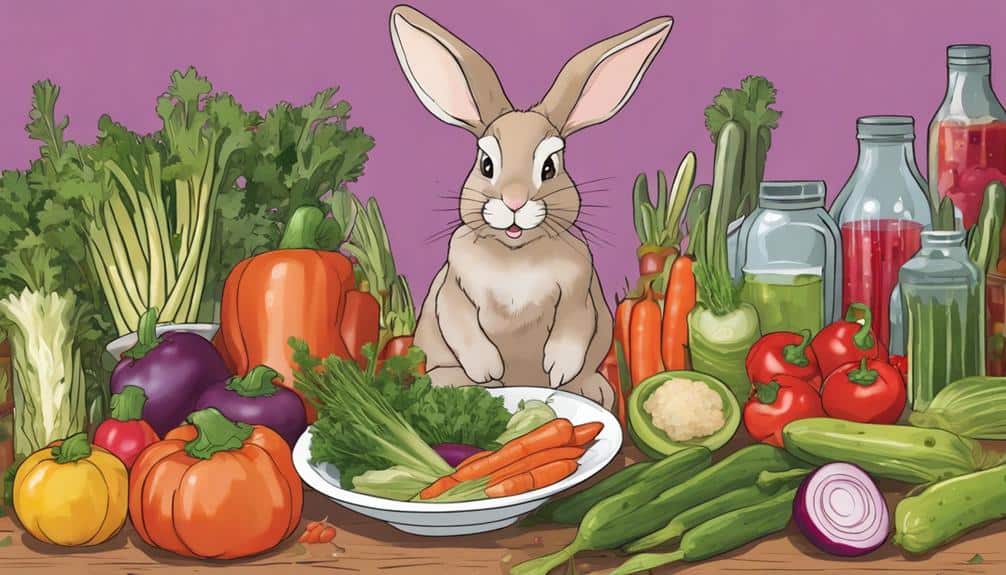
Considering the risks associated with pickles for bunnies, it is important to understand essential considerations before allowing your rabbit to consume them. Rabbits should avoid pickles due to their high salt and vinegar content, which can be harmful to their delicate digestive systems. These unsuitable snacks offer no nutritional benefits and can lead to digestive issues in pet rabbits. To ensure your bunny's well-being, it is crucial to keep pickles away from them to prevent accidental ingestion. Check out the table below for a quick overview of why pickles are not suitable for your furry friend:
| Consideration | Explanation |
|---|---|
| High salt content | Can be harmful to a bunny's health |
| Vinegar content | May disrupt the delicate digestive system |
| Unsuitable for rabbits | Lack nutritional value for pet rabbits |
| Digestive issues | Can cause stomach problems in bunnies |
| Avoidance necessary | Prevent accidental consumption and potential harm |
Impact of Pickles on Bunny Health
With their high-sodium brine and disruptive vinegar content, pickles can have detrimental effects on a bunny's health. Rabbits are sensitive animals, and even a small amount of sodium found in pickles can cause severe health issues.
Pickle juice, which is a common component in pickles, contains too much salt for a bunny's delicate digestive system. This excess salt intake can lead to dehydration and electrolyte imbalances in rabbits. Moreover, the vinegar present in pickles can disturb a bunny's gut flora, potentially causing digestive discomfort and diarrhea.
Due to these reasons, pickles should never be fed to rabbits. It's essential to make sure that bunnies don't consume pickles as they're nutritionally inappropriate and can harm their well-being. To safeguard your bunny's health, it's best to avoid offering any pickles as part of their diet.
Best Practices for Offering Pickles to Bunnies
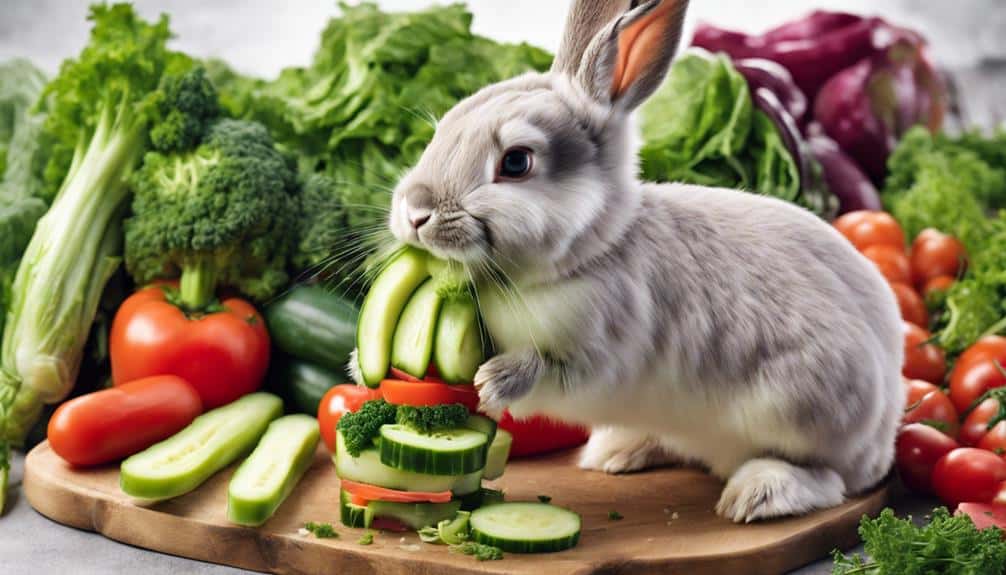
To guarantee the well-being of your bunny, it is important to grasp the potential risks associated with offering pickles as part of their diet. Rabbits need a balanced diet to stay healthy, and including pickles can be harmful due to their high salt and vinegar content. If you are considering feeding your rabbit pickles, it is essential to understand that even a small piece can be toxic to them. If your bunny ingests a high amount of pickles, contact a vet right away. To reduce the risk of harm, it's a good idea to avoid giving pickles to your rabbit altogether. Instead, focus on providing a diet rich in fresh vegetables, hay, and herbs. The table below summarizes why pickles are not suitable for rabbits:
| Risk Factors | Potential Issues | Best Practice |
|---|---|---|
| High in Sodium | Gastrointestinal Upset | Avoid Pickles |
| Vinegar Content | Digestive Distress | Opt for Fresh Foods |
| Toxic Ingredients | Health Complications | Consult a Vet |
Frequently Asked Questions
What Food Bunnies Cannot Eat?
Avoid feeding your bunny toxic plants, harmful vegetables, dangerous fruits, forbidden nuts, unsafe herbs, toxic flowers, harmful grains, forbidden seeds, dangerous spices, and toxic treats. Stick to safe options like fresh veggies and hay.
Can Bunny Eat Cucumbers?
Bunnies can eat cucumbers as safe snacks, but in moderation. They are nutritious and hydrating. Always wash vegetables thoroughly. Remember, too much can lead to digestive issues like diarrhea. Consider cucumber preferences when adding to a rabbit's diet.
What Real Food Can Bunnies Eat?
When it comes to what real food bunnies can eat, make sure they munch on carrot tops for a treat, opt for leafy greens like romaine, strike a balance between hay and pellets, and offer fresh fruits in moderation.
Why Can't Rabbits Eat Bananas?
You can't feed rabbits bananas due to high sugar content causing digestive issues, obesity risks, and gut flora imbalance. Their diet needs fibrous foods, limiting fruit treats. It's essential to take into account their nutritional needs and digestive system health.
Conclusion
To sum up, bunnies should steer clear of pickles to stay healthy and happy. The potential pitfalls of pickles for bunnies include digestive distress and toxicity risks.
Remember, rabbits thrive on a diet rich in hay, fresh veggies, and limited treats. Keep pickles off the menu to prevent any bunny belly blues. Stick to safe and nutritious options to keep your furry friend hopping with joy!

